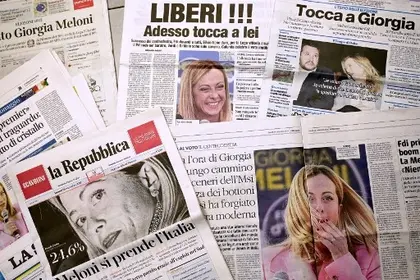There were few surprises in the Italian elections held on Sep. 25. The center-right coalition won 44% of the votes for the Senate, far more than the center-left coalition, with 27%, according to the vote count reported by Italian daily La Repubblica.
Within the center-right coalition, comprised of Brothers of Italy (FdI), Forza Italia (FI) and the Lega, Giorgia Meloni’s FdI came out as the big winner with more than 26% of the vote. This was exactly what opinion polls leading up to the vote had predicted, and much of Europe was concerned about the party’s roots in Italy’s various neo-fascist movements. It means Meloni is on course to become the country’s first female prime minister.
JOIN US ON TELEGRAM
Follow our coverage of the war on the @Kyivpost_official.
As far as Ukraine is concerned, Meloni, as opposed to hardcore sovereigntists throughout Europe – France’s Marine Le Pen and Hungary’s Viktor Orban, for instance – is staunchly Atlanticist and pro-NATO.
She has repeatedly said that she will not allow Italy to become a weak link in the anti-Putin coalition. Rather than break from the European Union, she prefers to reform it. She has called for streamlining the bureaucracy to allow for more sovereign decision-making, though she has always been vague on the details of how to do this.
Ukraine’s biggest concern was the popularity of three parties that are major “Putin’s friends”: the 5 Star Movement, which caused the government of Mario Draghi to fall in late July, because they resisted Draghi’s continued arming of Ukraine; the Lega, whose leader Matteo Salvini liked to pose with Putin T-shirts in front of the Kremlin; and FI, led by Silvio Berlusconi, a longtime ally of Putin’s, who just a few days before the election justified Russia’s invasion by saying “Putin was pushed by his own people to go into Kyiv and replace Zelensky with some decent folks.”
Fortunately for Zelensky and Ukraine, all three parties took a beating. The two members of the center-right coalition, Lega and FI, got 9% and 8%, respectively. The 5 Star Movement dropped from over 30% in the last elections to 15% in this one.
In the meantime, the center-left Democratic Party, which has been a steady supporter of Ukrainian resistance, tallied in at about 20%.
This outcome will give a lot more weight to Meloni in crafting her foreign policy. Most Italy-watchers feel she will make sure to appoint foreign and defense ministers from outside her party (which has a dearth of members as astute as her) who are amenable to the U. S. in order to not falter during this crucial winter in Ukraine’s fight against Moscow.
Where she can be expected to play hardball is with the EU’s policy toward price caps on gas and oil which, she says, Italy needs. With respect to this issue, despite her being nominally in opposition to the Draghi government, she is on the same page and will surely want to make her presence felt in Brussels.
The perennial problem in Italian politics has been the inability of any government to create a coalition with sufficient votes to get anything done. Governments in Rome seem to fall with the slightest breeze.
Although Meloni’s plurality and coalition put her in a strong position, there’s always the chance of defections (everyone is looking at Salvini). In that case the option of a technocratic transition government would be floated, since that seems to be Rome’s default mode in recent years. Many would hope for Draghi to come back in that scenario – his popularity was unprecedented beyond the precincts of the back-stabbing political classes – but it’s highly unlikely barring a national catastrophe.
So, while a Meloni victory is nowhere near as desirable for Ukraine as the continuation of Draghi, who was steadfastly pro-Ukrainian and had a lot of international clout, the result could have been much worse.
The views expressed in this article are the author’s and not necessarily those of the Kyiv Post.
You can also highlight the text and press Ctrl + Enter



